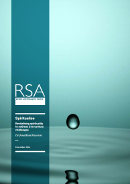
Details
| Title | Spiritualise |
| Author | Jonathan Rowson |
| Publisher | RSA |
| Published | 2014 |
| Get | Read / watch this |
Related conversations



Related Materials

Recommended by

Spiritualise
Pay attention to the myriad addictions of apparently normal behaviour and what passes for everyday consciousness begins to look like a low-level psychopathology; we are literally caught up in our smart phones, our social medicines, our curated identities, but perhaps none bring deep satisfaction in the way that gradual mastery of consciousness through spiritual practice can.
This project speaks directly to this third form of secularisation, these wavering ‘conditions of belief’ in which society’s spiritual diffusion means there is no shared touchstone to illuminate the purpose of our lives. In this respect ‘spirituality’ is a typically postmodern phenomenon; there is a disorienting sense of fragmentation but also a shared hunger for a larger framework of meaning and excitement that we may be giving birth to something new.
Madeleine Bunting refers to the ‘aspiration error’ that arises from the danger of conflating or confusing the aims of spirituality with those of psychological wellbeing. While we may rightly wish to be happy, the spiritual helps to make sense of why pursuing happiness directly is often self-defeating; it is often fundamentally ungrounded in reality.
By our ground I mean the most basic facts of our existence: that we are here at all, that we exist in and through this body that somehow breathes, that we build selves through and for others, that we’re a highly improbable part of an unfathomable whole, and of course, that we will inevitably die. Another way to characterise the relevance of our ground comes from the psychotherapist Mark Epstein who refers to the spiritual as “anything that takes us beyond the personality”.
The point is not to casually introspect, but rather to strive to connect our advanced third-person understanding of human nature with a growing skill in observing how one’s first-person nature manifests in practice, and to test the validity and relevance of this experience and understanding in second-person contexts. In this sense, spirituality is about I, we and it, and this process of trying to know oneself more fully, both in understanding and experience, is therefore no mere prelude to meaningful social change, but the thing itself.
The ways in which our automatic and habitual processes contextualise the world below consciousness directly circumscribes our ability to learn, because it affects our openness to experience – a key determinant of our interest in spiritual matters. Francisco Varela makes a similar claim arguing that it is principally at ‘breakdowns’ – moments where we do not have a habitual reaction available to respond to an unexpected stimulus, that consciousness is brought forth to reconstitute our ‘micro-worlds’ – to refashion our interpretation of the lived environment so that we can intelligibly act within it. Spiritual training can therefore be thought of as what we need to be ready for such moments – we need not only the capacity to make ourselves present to what is happening, but also to mobilise the better aspects of our selves.
We rarely succeed in changing our habits and thereby shaping our lives in the way we want to if we ‘go it alone’. Instead we tend to need what Avne Offer called ‘commitment devices’. Offer argues that humans have unhitched themselves from the institutions that are protective against the inherent short-sightedness of the human condition, including religious institutions.
Dr Clare Carlisle suggested that “An orientation to truth and goodness” is what gives a practise meaning and makes one want to continue, but this is a challenge for those who believe you can, for instance, completely secularise mindfulness meditation, turn it into ‘attention training’ and strip it of all ethical content.
The point is that making things more explicit does not make them better. In ritual, we see an embodied metaphor in which meaning is beyond the explicit, and this is precious. If we lose sight of the value of such rituals we are in danger of losing the distinction between mythos and logos. Iain emphasised that narrative, metaphor and implicit meaning are key to spirituality and that spirituality at its heart is about modesty, about not knowing, ending his talk with the evocative line: “Life is a superfluous gift calling for gratitude and tenderness.”
If reflecting on our own deaths tends to promote intrinsic values and weaken extrinsic values, and concealing death has the opposite effect, our cultural representations of death clearly have much greater political and economic implications than we tend to realise.
[...] as a person begins to view their time as limited (rather than abundant or open-ended), the types of goals they pursue change from acquisition of knowledge/resources to the regulation of emotion. In other words, when we realise that our time in life is finite, we prioritise emotionally meaningful goals and experiences. In these circumstances, people tend to forego maintaining many superficial relationships in favour of deepening the few deemed most significant. This general family of shifts has been correlated with increased emotional experiences and wellbeing in late life.
The soul is about our experience as such, while the self is about the commentary we give to experience.
The language of soul and soulfulness has enormous value for the arts broadly conceived and part of the reason we need to find the courage to speak of the soul, is because it is the authentic language of the arts in a way that cost-benefit social return on investment calculations never can be.